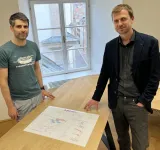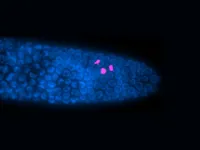Proteins that act like air traffic controllers, managing the flow of signals in and out of human cells, have been observed for the first time with unprecedented detail using advanced microscopy techniques.
Described in new research published today in Cell, an international team of researchers led by Professor Davide Calebiro from the University of Birmingham has seen how beta-arrestin, a protein involved in managing a common and important group of cellular gateways, known as receptors, works.
Beta-arrestin is involved in controlling the activity of G protein-coupled receptors (GPCRs) which are the largest group of receptors in the human body and mediate the effects of many hormones and neurotransmitters. As a result, GPCRs are major targets for drug development and between 30-40% of all current therapeutics are against these receptors. Once the receptors are activated, beta-arrestins dampen the signal in a process called desensitisation but can also mediate signals of their own.
The new study published in Cell has unexpectedly revealed that beta-arrestins attach themselves to the outer cell membrane waiting for hormones or neurotransmitters to land on receptors. Surprisingly, the interactions between beta-arrestins and active receptors are much more dynamic than previously thought, allowing for a far better control of receptor-mediated signals.
Davide Calebiro, Professor of Molecular Endocrinology in the Institute of Metabolism and Systems Research at the University of Birmingham and Co-Director of the Centre of Membrane Proteins and Receptors (COMPARE) of the Universities of Birmingham and Nottingham said:
“In our study, we used innovative single-molecule microscopy and computational methods developed in our lab to observe for the first time how individual beta-arrestin molecules work in our cells with unprecedented detail.
“We have revealed a new mechanism that explains how beta-arrestins can efficiently interact with receptors on the plasma membrane of a cell. Acting like air traffic controllers, these proteins sense when receptors are activated by a hormone or a neurotransmitter to modulate the flow of signals within our cells. By doing so, they play a key role in signal desensitisation, a fundamental biological process that allows our organism to adapt to prolonged stimulation.
“These results are highly unexpected and could pave the way to novel therapeutic approaches for diseases such as heart failure and diabetes or the development of more effective and better tolerated analgesics.”
Pioneering research methods could lead to novel drug therapies
This success was only possible thanks to the unique multidisciplinary collaborative environment provided by COMPARE, a world-leading research centre for the study of membrane proteins and receptors that brings together 36 research groups with complementary expertise in cell biology, receptor pharmacology, biophysics, advanced microscopy and computer science.
The novel single-molecule microscopy and computational approaches developed in this study could provide a significant new tool for future drug development, allowing researchers to directly observe how therapeutic agents modulate receptor activity in living cells with unprecedented detail. In the future, COMPARE researchers led by Prof Calebiro plan to further automate the current pipeline so that it can be used to screen for novel drugs such as biased opioids currently in development for the treatment of pain.
Dr Zsombor Koszegi, who shares first co-authorship of the study with Dr Jak Grimes and Dr Yann Lanoiselée, said:
“Being able to see for the first time how individual receptors and beta-arrestins work in our cells was incredibly exciting.
“Our findings are highly unexpected and bring our understanding of the way beta-arrestin coordinates receptor signalling to a whole new level, with major implications for cell biology and drug discovery.”
The research was funded by the Wellcome Trust, Medical Research Council and the DBT/Wellcome Trust India Alliance.
END
Cellular traffic controllers caught managing flow of signals from receptors
First time that individual beta-arrestin molecules are directly observed as they control receptor-mediated signals in living cells using advanced microscopy
2023-05-04
(Press-News.org)
ELSE PRESS RELEASES FROM THIS DATE:
Gene Tiam1 orchestrates the development of chronic neuropathic pain
2023-05-04
Neuropathy is a type of chronic pain triggered by nerve injury or certain diseases. It affects millions of people worldwide, significantly deteriorating their quality of life. Neuropathy, for example, might emerge from hurting the sciatic nerve on the lower back or the spinal cord, in diseases like rheumatoid arthritis and diabetes or after chemotherapy drugs. Current therapies attempt to suppress the symptoms with pain medications like opioids, but their efficacy is low, and they carry undesirable side effects.
A group led by researchers at Baylor College of Medicine and University of Alabama at Birmingham took on the challenge of investigating the process ...
The future of data storage lies in DNA microcapsules
2023-05-04
Storing data in DNA sounds like science fiction, yet it lies in the near future. Professor Tom de Greef expects the first DNA data center to be up and running within five to ten years. Data won’t be stored as zeros and ones in a hard drive but in the base pairs that make up DNA: AT and CG. Such a data center would take the form of a lab, many times smaller than the ones today. De Greef can already picture it all. In one part of the building, new files will be encoded via DNA synthesis. Another part will contain large fields of capsules, each capsule packed with a file. A robotic arm will remove a capsule, read its contents and place it back.
We’re talking about synthetic ...
Quantum computer in reverse gear
2023-05-04
Today's computers are based on microprocessors that execute so-called gates. A gate can, for example, be an AND operation, i.e. an operation that adds two bits. These gates, and thus computers, are irreversible. That is, algorithms cannot simply run backwards. “If you take the multiplication 2*2=4, you cannot simply run this operation in reverse, because 4 could be 2*2, but likewise 1*4 or 4*1,” explains Wolfgang Lechner, professor of theoretical physics at the University of Innsbruck. If this were possible, however, it would be feasible ...
Seizure discoveries advance efforts to develop better treatments
2023-05-04
New University of Virginia School of Medicine insights into how the brain responds to seizures could facilitate the development of much-needed treatments for the third of patients who don’t respond to existing options.
The research, from the labs of UVA’s Ukpong B. Eyo, PhD, and Edward Perez-Reyes, PhD, suggests that immune cells called microglia play important, beneficial roles in controlling various types of seizures. Prior research had left scientists uncertain whether these cells were helpful or harmful during the brain’s ...
Taylor & Francis set to open over 50 book titles with Knowledge Unlatched
2023-05-04
Taylor & Francis is delighted to announce the results of Knowledge Unlatched (KU) 2023, with support pledged to convert over 50 book titles to open access (OA). Titles to benefit from this support cover a broad range of humanities and social science disciplines as well as key topic areas, including climate change, global health, and gender studies.
Under the KU crowdfunding model, research libraries around the world unite to support the publication costs of new eBooks and enable access for all to important new research. Since 2016, when Taylor & Francis’ partnership with Knowledge Unlatched began, over 100 books have been published OA at no cost ...
Obesity as a risk factor for colorectal cancer underestimated so far
2023-05-04
Obesity is a known risk factor for colorectal cancer. Scientists at the German Cancer Research Center (DKFZ) have now shown that this association has probably been significantly underestimated so far. The reason: many people unintentionally lose weight in the years before a colorectal cancer diagnosis. If studies only consider body weight at the time of diagnosis, this obscures the actual relationship between obesity and colorectal cancer risk. In addition, the current study shows that unintentional weight loss may be an early indicator of colorectal ...
Happy worms have healthy eggs
2023-05-04
Worms might not be depressed, per se. But that doesn’t mean they can’t benefit from antidepressants.
In a new study, Northwestern University researchers exposed roundworms (a well-established model organism in biological research) to selective serotonin reuptake inhibitors (SSRIs), a class of drugs used for treating depression and anxiety. Surprisingly, this treatment improved the quality of aging females’ egg cells.
Not only did exposure to SSRIs decrease embryonic death by more than twofold, it also decreased chromosomal abnormalities in surviving offspring by more than twofold. Under the microscope, ...
New guidance to help diagnose hoarding disorder
2023-05-04
Experts from Anglia Ruskin University (ARU) have published new guidance to help doctors correctly diagnose hoarding disorder.
Hoarding disorder affects around 2% of the population but remains a largely misunderstood mental health condition. It was only added to the International Classification of Diseases in 2019, having previously been classified under Obsessive Compulsive Disorder (OCD).
Published in the British Journal of General Practice, the new guidance was written by Dr Sharon Morein and Dr Sanjiv Ahluwalia of Anglia Ruskin University (ARU) in Cambridge, England, to help health professionals spot the signs of hoarding disorder and intervene.
ARU experts have also organised a free ...
GlyNAC supplementation improves cognitive decline and brain health in aging
2023-05-04
As people get older, they aspire to live healthy lives as free as possible from the natural decline of cognitive abilities that occurs with aging. At Baylor College of Medicine, researchers have been studying the biological underpinnings of age-associated cognitive decline and developing nutritional strategies to promote healthy brain aging.
They report today in the journal Antioxidants that supplementing GlyNAC – a combination of glycine and N-acetylcysteine as precursors of the natural antioxidant glutathione – improved or reversed age-associated cognitive decline in old mice and improved ...
Three NYU faculty elected to the National Academy of Sciences
2023-05-04
Three New York University faculty have been elected to the National Academy of Sciences: Moses Chao, a professor at NYU Grossman School of Medicine; Glennys Farrar, a professor in NYU’s Department of Physics; and Subhash Khot, a professor in NYU’s Courant Institute of Mathematical Sciences. This year’s election of 120 new members and 23 international members were chosen “in recognition of their distinguished and continuing achievements in original research,” the academy announced.
Moses Chau, a professor of cell biology, psychiatry, and neuroscience and physiology and part of ...
LAST 30 PRESS RELEASES:
Low-intensity treadmill exercise preconditioning mitigates post-stroke injury in mouse models
How moss helped solve a grave-robbing mystery
How much sleep do teens get? Six-seven hours.
Patients regain weight rapidly after stopping weight loss drugs – but still keep off a quarter of weight lost
GLP-1 diabetes drugs linked to reduced risk of addiction and substance-related death
Councils face industry legal threats for campaigns warning against wood burning stoves
GLP-1 medications get at the heart of addiction: study
Global trauma study highlights shared learning as interest in whole blood resurges
Almost a third of Gen Z men agree a wife should obey her husband
Trapping light on thermal photodetectors shatters speed records
New review highlights the future of tubular solid oxide fuel cells for clean energy systems
Pig farm ammonia pollution may indirectly accelerate climate warming, new study finds
Modified biochar helps compost retain nitrogen and build richer soil organic matter
First gene regulation clinical trials for epilepsy show promising results
Life-changing drug identified for children with rare epilepsy
Husker researchers collaborate to explore fear of spiders
Mayo Clinic researchers discover hidden brain map that may improve epilepsy care
NYCST announces Round 2 Awards for space technology projects
How the Dobbs decision and abortion restrictions changed where medical students apply to residency programs
Microwave frying can help lower oil content for healthier French fries
In MS, wearable sensors may help identify people at risk of worsening disability
Study: Football associated with nearly one in five brain injuries in youth sports
Machine-learning immune-system analysis study may hold clues to personalized medicine
A promising potential therapeutic strategy for Rett syndrome
How time changes impact public sentiment in the U.S.
Analysis of charred food in pot reveals that prehistoric Europeans had surprisingly complex cuisines
As a whole, LGB+ workers in the NHS do not experience pay gaps compared to their heterosexual colleagues
How cocaine rewires the brain to drive relapse
Mosquito monitoring through sound - implications for AI species recognition
UCLA researchers engineer CAR-T cells to target hard-to-treat solid tumors
[Press-News.org] Cellular traffic controllers caught managing flow of signals from receptorsFirst time that individual beta-arrestin molecules are directly observed as they control receptor-mediated signals in living cells using advanced microscopy


